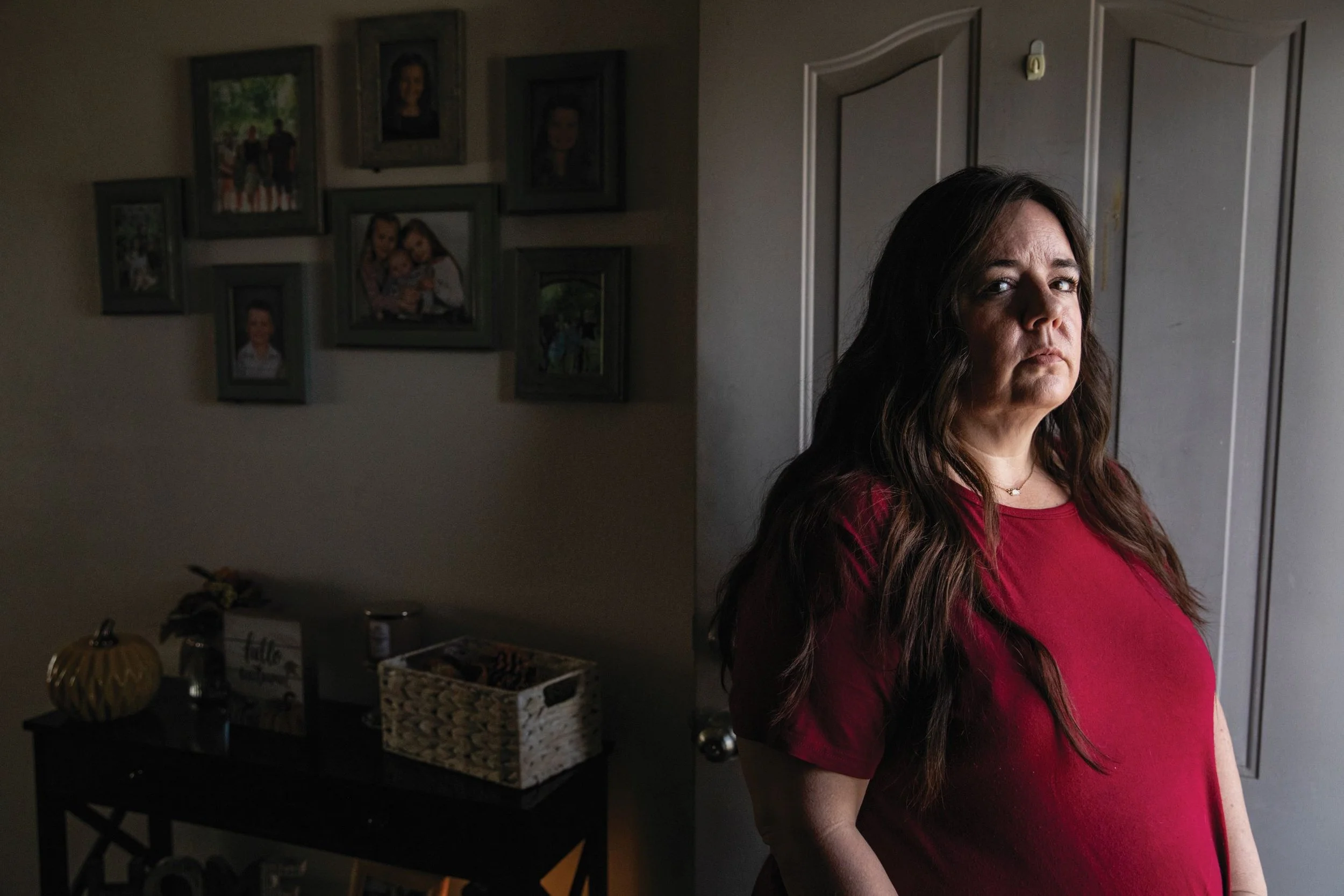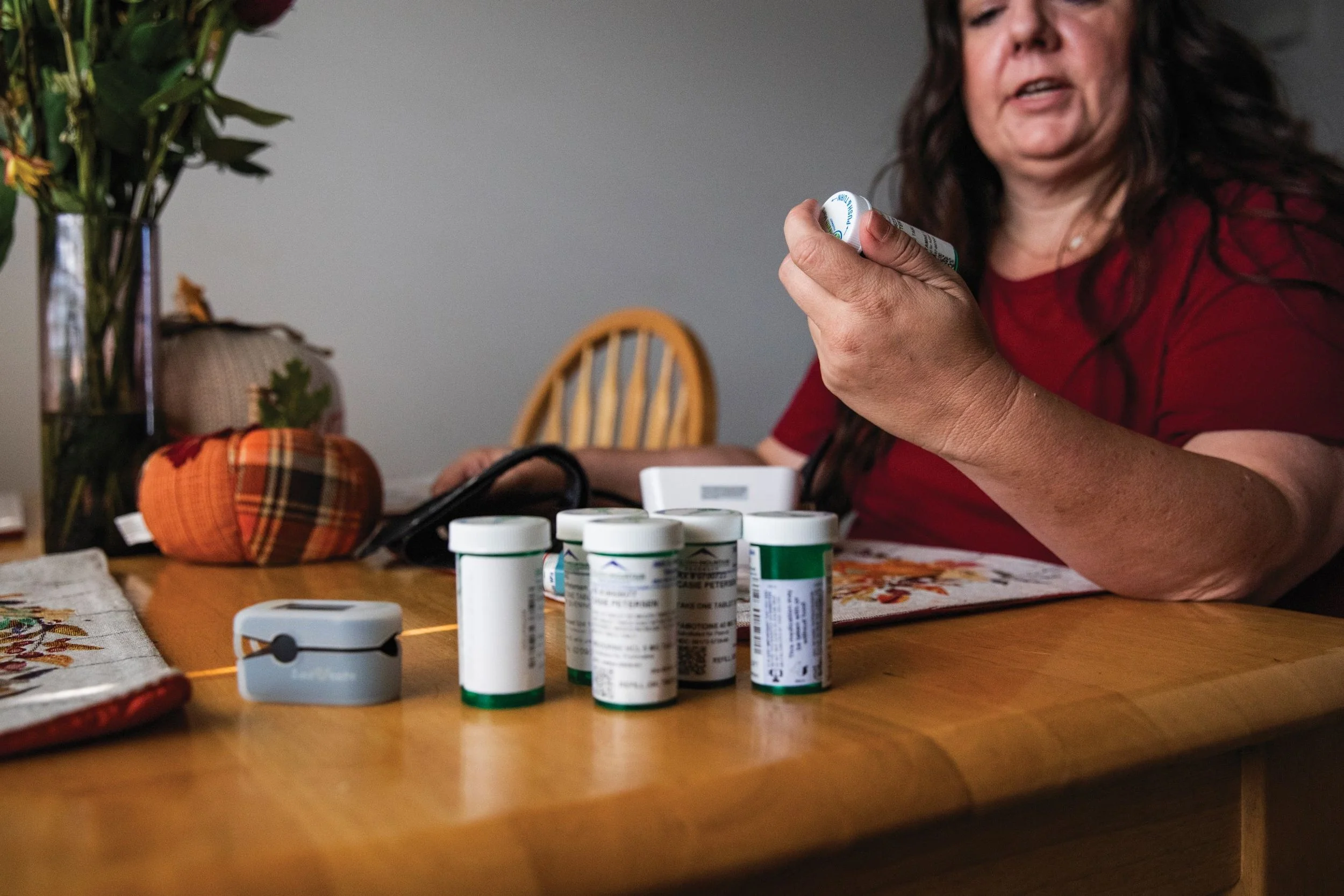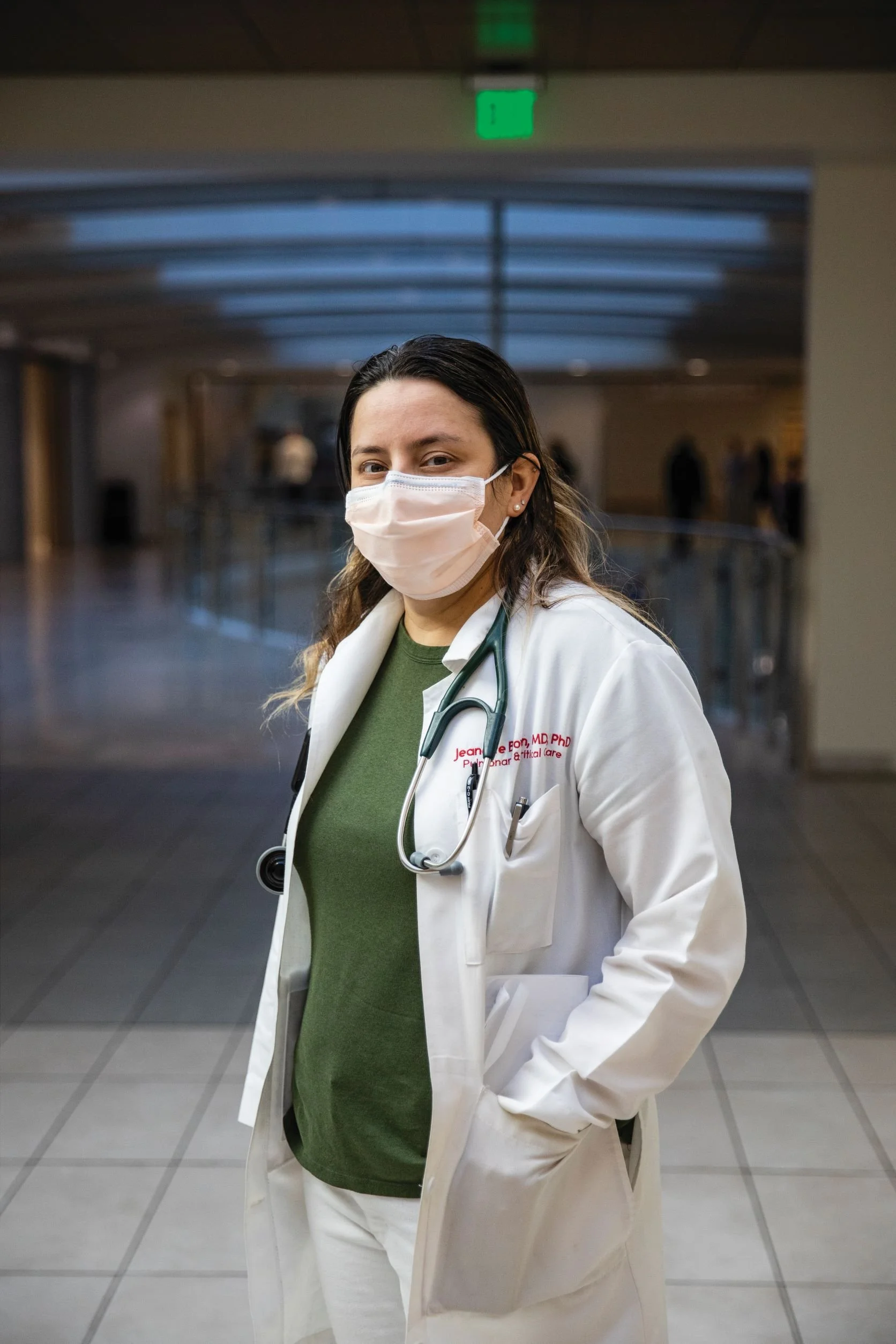In for the Long Haul
New University of Utah Health clinic cares for COVID-19 patients whose symptoms refuse to go away.
By Doug Dollemore
Photos by Joe Buglewicz
Casie Petersen’s garden has weeds.
This upsets her. Petersen cares about her garden, and she doesn’t want it to have weeds.
It wasn’t long ago that her garden was filled with tulips and daffodils. Any intruding plant was quickly uprooted.
But that was before COVID-19, before her body was ravaged by medical conditions and symptoms that spring up like prickly thistles. For Petersen, the aftermath of COVID has been a relentless series of roadblocks.
Life for the 47-year-old Magna resident hasn’t been the same since October 3, 2020—the day she first developed COVID symptoms. Since that day Petersen has:
been hospitalized for a week and had to go to the ER six times in an eight-week span
been diagnosed with neuralgia, postural orthostatic tachycardia syndrome (POTS), myalgic encephalomyelitis (chronic fatigue syndrome), mast cell activation syndrome, and asthma
suffered from tinnitus in her right ear
needed to use supplemental oxygen when sleeping
Petersen continues to have an intermittent cough, body aches, a diminished sense of smell, and difficulty thinking clearly, what she calls “brain fog.”
“One of the worst things I deal with is neuropathy,” Petersen said. “My hands are so weak now that I can barely grip things from the pain and numbness in them that I get all night.
“I enjoy doing things with my kids and grandkids and I’m unable to do as much now. I hate when my 5-year-old grandson calls asking to come over to play and I can’t say yes all of the time like I used to because I’m stuck in bed.”
For months, Petersen struggled to get any definitive answers. It wasn’t until she was referred to University of Utah Health that Petersen’s doctors determined the underlying cause: post-acute sequelae of SARS-CoV-2 infection (PASC), commonly known as “Long Hauler Syndrome.”
U of U Health experts offer tips to encourage reluctant patients to get vaccinated for COVID-19.
Petersen was one of the first patients seen at the University of Utah Health COVID-19 Clinic. The comprehensive clinic, which began accepting appointments on July 1, offers medical services to COVID long haulers in the Mountain West—people with one or more symptoms that have persisted for weeks or months after an initial infection. At least 50 percent of people who survive COVID-19 experience a variety of physical and psychological health issues for six months or more after their initial recovery, according to the journal JAMA Network.
“For the first time, I feel as if someone is listening to me and really wants to understand what I’m going through,” Petersen said. “I finally feel like there may be hope.”
Beyond the physical suffering, COVID has taken an emotional toll on Petersen.
Like so many long haulers, she just wanted someone to listen to her and take her seriously.
Jeanette Brown, MD, PhD, the medical director of the COVID-19 Clinic, said that most long haulers aren’t looking for an instant cure; what they really want is a sympathetic ear.
With that in mind, the U of U Health’s goal in establishing the clinic was to address the needs of COVID long-haulers “in the best and most effective ways we can in an environment where precise, patient-centered care is paramount,” according to Brown, who earned her BS in laboratory science through the Spencer Fox Eccles School of Medicine.
Jeannette Sherman, APRN, with U of U Health’s Imaging and Neurosciences Center, referred Petersen to the clinic. Sherman had diagnosed several of Petersen’s conditions and was determined to get to the bottom of what was wrong, and pushed for her to get into the COVID-19 Clinic.
During her initial visit, Petersen was evaluated by Brown, a pulmonologist who is an assistant professor of internal medicine at U of U Health.
“She listened and validated what I said instead of just going through the motions like so many of the doctors I had seen outside of the university health care system,” Petersen said. “She seemed really concerned and got me appointments with specialists without having me have to do anything.”
“I want to work and do normal, everyday things without having to worry that I might have to spend days in bed afterward.”
Brown referred Petersen to two of her U of U Health colleagues, Jeanette E. Voyt, MD, a family practice physician, and Benjamin Steinberg, MD, MHS, an assistant professor of medicine in the Division of Cardiovascular Medicine.
Long haulers experience symptoms ranging from mild to debilitating. They include fatigue, shortness of breath, cough, memory problems, and loss of smell or taste. The COVID-19 Clinic has a deep bench of health-care expertise to address their needs.
Clinic patients are evaluated by an advance practice clinician or a nurse who, in consultation with Brown, coordinate care with physicians and practitioners in more than 10 specialties including dermatology; cardiology; endocrinology; ear, nose, and throat (ENT); infectious disease; nephrology; neurology; psychiatry; pulmonary; physical medicine and rehabilitation; and social work.
“The University of Utah health system has many caring and knowledgeable health professionals in many different areas of specialization,” Brown said. “COVID-19 affects several different organ systems and has many symptoms. Under the support of Dr. John Inadomi, department chair of internal medicine, and many others, we have been able to come together to support patient care and research to learn more about COVID-19 effects.”
Brown describes the clinic as a “care navigation center,” designed to ensure that patients receive referrals to subspecialities that directly relate to their lingering symptoms. The goal of the clinic is to add guidance about post-COVID-19 care and not replace primary care providers, which with the patient relationship is important.
The opening of the COVID-19 Clinic has created a bevy of new opportunities for U of U scientists to study the disease’s long-term effects.
At their first appointments, long haulers meet with the clinic team. Each appointment lasts for one hour where many common symptoms of COVID-19 are evaluated. Following these sessions, the team reviews the patient’s symptoms experienced upon initial infection versus what they are experiencing now, identifying what—if anything—can be done to alleviate their long-hauler health problems. The team also aims to sort out what symptoms and conditions might be unrelated to COVID-19.
“Some people, for instance, may have been diagnosed with diabetes or pre-diabetes after COVID,” Brown said. “Whether that was brought on by COVID or if they were already pre-diabetic or diabetic and didn’t know it is something that we have to seriously consider before referring them for additional long-hauler treatment. The goal is to make sure patients receive the appropriate care for their current issues including diabetes and other conditions that may be related to COVID.”
Coordinating through a single provider helps specialists concentrate on what they can specifically do for a patient as part of an overall care plan.
“I can stay focused on their shortness of breath or other pulmonary issues, knowing that they’re going to get the cardiovascular or neurological care they might need without me having to reach out to my colleagues in those departments,” said Mary Beth Scholand, MD, an associate professor in pulmonary medicine who is part of the clinic. “It’s going to allow us to be really directed and efficient, hopefully leading to better care for these long-term COVID patients.”
The need for a dedicated long-haulers clinic was identified back in November 2020 during the height of the pre-vaccine pandemic.
“Not only were we seeing a lot of COVID inpatients, but we were also starting to accumulate more and more outpatients whose symptoms were still persisting,” Brown said. “The need for a long haulers clinic was highly evident, and after many months of behind-the-scenes work and the support of institutional leadership, we have finally opened our doors.”
In the 744 days (as of January 6) since the first COVID-19 case was reported in Utah, more than 672,000 incidences of the disease have been confirmed in the state.
In most of those cases, the viral infection ran its course without lingering symptoms. But for some, the effects of the disease persisted. In late August, the American Academy of Physical Medicine and Rehabilitation estimated that approximately 100,000 Utahns had experienced lingering COVID-19 symptoms.
During its first few weeks of operation, the COVID-19 Clinic evaluated about 80 post-acute sequelae of SARS-CoV-2 (PASC) patients a week. The clinic also had about 300 patients on a waiting list in late July, which was lengthening by about 10 to 15 patients a day. The clinic has now seen more than 150 patients, and sees patients four full days a week.
“It’s like Field of Dreams: ‘If you build it, they will come,’ which is good,” Brown said. “A lot of these patients have desperately sought somewhere to receive support and understanding. Now, fortunately, it’s available.”
In addition to patient care, the clinic is conducting research on the long-term effects of COVID-19 in hopes that it will lead to better treatments.
“Right now, treating COVID-19 and its long-term effects is like jumping out of an airplane and trying to make the parachute as you go down,” Brown said. “We still have a lot to learn about it. By gathering evidence and developing clinical pathways that are based on collaborative learning, we can funnel this knowledge into improving all aspects of long hauler care.
“Research studies associated with the clinic will also help us learn more about conditions such as chronic fatigue and other post-viral syndromes. Many patients that are still dealing with COVID-19 symptoms are interested in helping us learn more and helping others that may be suffering.”
“A lot of these patients have desperately sought somewhere to receive support and understanding. Now, fortunately, it’s available.”
The clinic plans to have collaborative educational sessions to help providers learn more about post COVID-19 symptoms. This will provide support for care providers as well, Brown said. These sessions are being planned currently.
She acknowledges, though, that so much about COVID-19 remains a mystery, even for those who work with it every day.
“Like almost every other physician, I’m still trying to figure out what we do and don’t know about COVID-19,” she said. “Unfortunately, my Star Trek tricorder is broken, and my magic wand is on the fritz, so I may not be able to fix everything. But we will do everything we can to provide the best care possible for these patients.”
Aside from the clinic, Petersen is also participating in a U of U Health post-COVID clinic study that involves working with a health coach. As a result, she is doing strength training and walking about one-half of a mile a day four times a week. While that’s progress, she also knows that she has far to go.
“I just want my life back,” said Petersen, who was a telephone customer service representative prior to COVID-19. “I want to work and do normal, everyday things without having to worry that I might have to spend days in bed afterward. I want to plant flowers in my garden and get rid of all of those weeds.”



